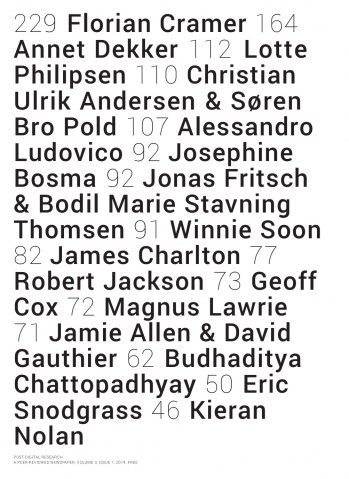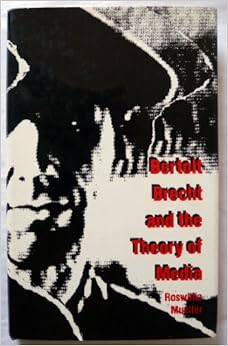W. J. T. Mitchell, Mark B. N. Hansen (eds.): Critical Terms for Media Studies (2010)
Filed under book | Tags: · aesthetics, autopoiesis, body, communication, cybernetics, image, information theory, language, law, mass media, media, media studies, media theory, memory, networks, posthuman, software, technology, writing

“Part of a larger conversation that engages culture, technology, and politics, this collection of essays explores critical language for dealing with the qualities and modes of contemporary media. The essays, commissioned expressly for this volume, are organized into three interrelated groups: “Aesthetics” engages with terms that describe sensory experiences and judgments, “Technology” offers entry into a broad array of technological concepts, and “Society” opens up language describing the systems that allow a medium to function.”
Contributors: Johanna Drucker (Art), Bernadette Wegenstein (Body), Bill Brown (Materiality), Bernard Stiegler (Memory), Caroline Jones (Senses), Eugene Thacker (Biomedia), Bruce Clarke (Communication, Information), N. Katherine Hayles (Cybernetics), Geoffrey Winthrop-Young (Hardware / Software / Wetware), John Johnston (Technology), David Graeber (Exchange), Cary Wolfe (Language), Peter Goodrich (Law), John Durham Peters (Mass Media), Alexander R. Galloway (Networks), David Wellbery (Systems), Lydia H. Liu (Writing), and W. J. T. Mitchell and Mark B. N. Hansen (Image, Time and Space, New Media).
Publisher University of Chicago Press, 2010
ISBN 0226532666, 9780226532660
376 pages
A Peer-Reviewed Journal About, 3(1): Post-Digital Research (2014)
Filed under journal | Tags: · aesthetics, media, media theory, postdigital, publishing, research

“This issue of the journal addresses the messy and paradoxical condition of art and media after digital technology revolutions and critically reflects on the term “post-digital”. The issue is the outcome of a process where a number of researchers, artist-researchers and Ph.D.’s have collaborated in presenting and exchanging ideas around the subject. This follows an earlier call from transmediale festival, Berlin, and a research event at Kunsthal Aarhus. The issue does not present a uniform interpretation of the notion, but includes a variety of positions related to the use of the term, its application within various fields, and how it is reflected in artistic research.”
With contributions by Jamie Allen, Christian Ulrik Andersen, Josephine Bosma, James Charlton, Budhaditya Chattopadhyay, Geoff Cox, Florian Cramer, Annet Dekker, Jonas Fritsch, David Gauthier, Robert Jackson, Magnus Lawrie, Alessandro Ludovico, Kieran Nolan, Lotte Philipsen, Søren Pold, Eric Snodgrass, Bodil Marie Stavning Thomsen and Winnie Soon.
Edited by Christian Ulrik Andersen, Geoff Cox and Georgios Papadopoulos
Publisher Digital Aesthetics Research Center, Aarhus University, Aarhus, in collaboration with reSource transmedial culture Berlin/transmediale, Berlin, Jun 2014
Creative Commons Attribution-NonCommercial-ShareAlike license
ISSN 2245-7755
HTML (updated on 2021-5-4)
PDFs (updated on 2021-5-4)
PDF (44 MB)
Roswitha Mueller: Bertolt Brecht and the Theory of Media (1989)
Filed under book | Tags: · aesthetics, cinema, film, film theory, media, media theory, opera, politics, radio, theatre

Bertolt Brecht spent a career puncturing artistic illusion while casting a spell as an innovator that has continued since his death in 1956. Best known to theater goers for “The Threepenny Opera,” “Mother Courage and her Children,” “The Caucasian Chalk Circle” and other production, the great playwright was, in fact, a man of all media. He was interested in radio and the cinema as soon as they appeared in Europe and brought to them, as well as to the stage, a dramatic theory so radical and influential that it has come to be known by the adjective “Brechtian.”
Publisher University of Nebraska Press, Lincoln & London, 1989
Modern German Culture and Literature series
ISBN 0803231326, 9780803231320
149 pages
Reviews: Katie Trumpener, Susan Bennett (Theatre Research International).
PDF (no OCR)
Comment (0)
